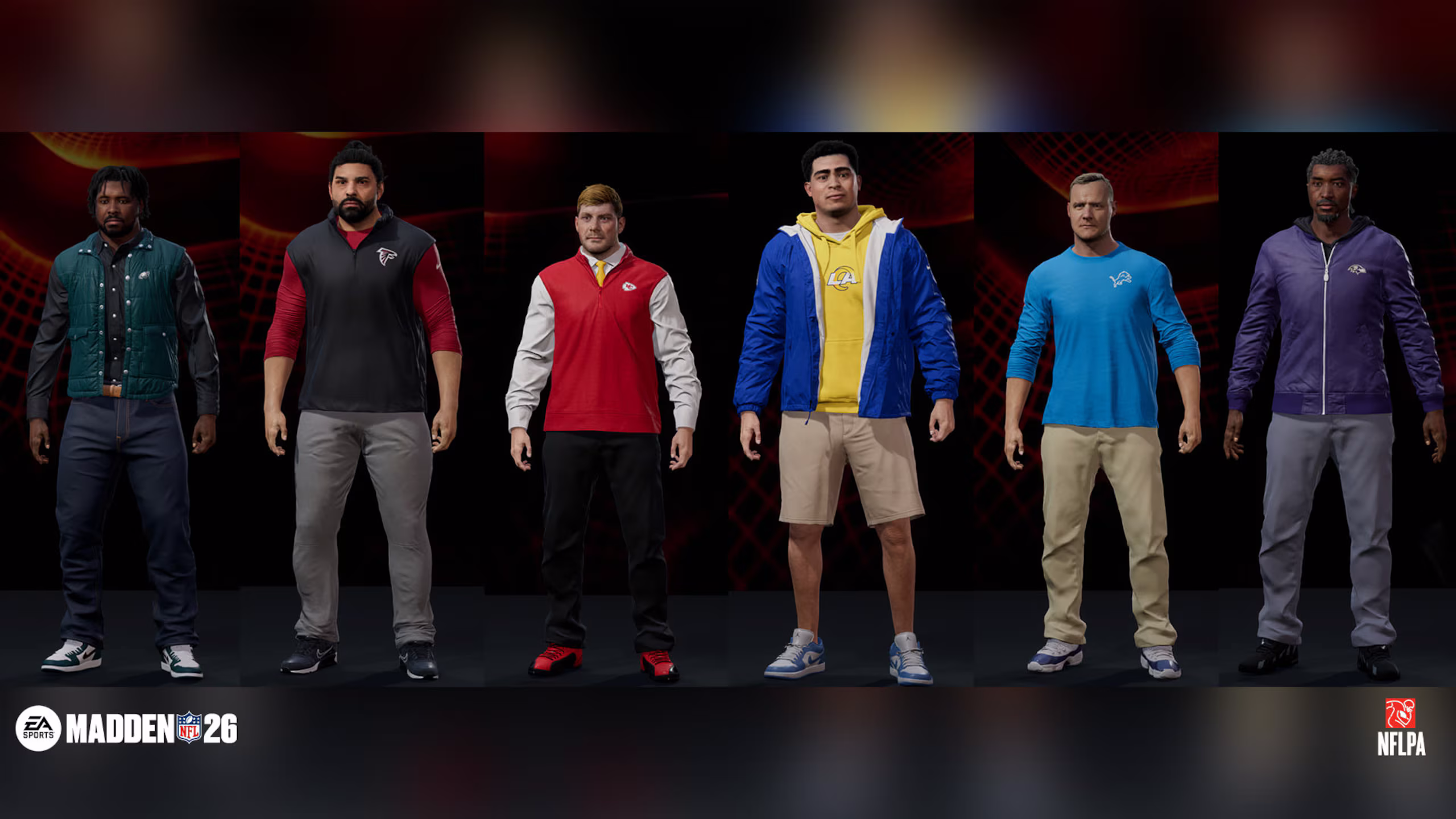For avid fans of Madden NFL Franchise Mode, prepare for an experience unlike any before. The development team proudly declares this to be the “biggest Franchise Mode update we’ve made in over a decade,” a bold statement reflecting the sheer scope of improvements. This deep dive aims to unravel the intricate details of what has been meticulously crafted, promising to reveal why the team couldn’t be more excited to share these innovations.
The passion for Franchise Mode within the development team is palpable. They openly admit to being “longtime fans just like you,” pouring that genuine enthusiasm into every facet of this year’s update. For Madden NFL 26, the focus was squarely on three pivotal areas. The overarching goal was to create a Franchise experience that is “deeper, more dynamic, and more true to the NFL experience.” This comprehensive overhaul targets core elements of the game.
First, the team wants players to “Feel Like a Real NFL Head Coach every single week, all season long.” This means every decision, from staff management to game preparation, will hold unprecedented weight. Second, a significant effort was made to ensure “Every Game Feels Different.” This involves diverse AI behaviors, player traits, and environmental factors, guaranteeing unique challenges in each matchup. Finally, the developers strived to make “Every Week feel Different.”
They want to imbue the game with the authentic rhythm of an NFL season, from the special atmosphere of Monday Night Football to the tangible shift in intensity as the calendar turns to December. Crucially, the team emphatically states that “ALL of that” will be delivered this year, promising an unparalleled level of immersion and strategic depth.
Before diving into the exciting new features, a critical underlying improvement deserves mention: loading speeds. The development team recognized and prioritized the need for quicker screen loading. They dedicated significant early development efforts to optimizing load times, acknowledging that previous iterations felt “sluggish.” While not the most glamorous of changes, this fundamental improvement is expected to significantly enhance the overall user experience, directly addressing a long-standing community request. Now, let’s explore the core new features, beginning with the all-new coaching experience.
Unveiling the New Coaching Experience: Customization and Archetypes
Madden NFL 26 introduces a revolutionary coaching experience, starting with unprecedented levels of personalization and strategic depth for your head coach.
Coach Creation and Visual Identity
To truly make your coach feel like an extension of your persona, their appearance needed a massive overhaul. The custom coaches feature has received a “massive overhaul,” providing players with extensive options for visual customization. You now have an impressive selection of “200 new heads to choose from” when creating your coach, ensuring a diverse range of facial features and styles. Beyond facial aesthetics, the game introduces a “ton of new gear exclusively for custom coaches.” This includes an expansive wardrobe with “more than 50 new shirts, 15 pants, and 40 shoes.” The sheer volume of clothing options allows for an astounding “more than 30,000 combinations” that you can choose to wear on the sidelines.
This level of detail extends to the breadth of available styles. You can now outfit your coach in anything from a formal “shirt & tie and slacks” to a more casual “sleeveless shirt and shorts.” This flexibility means you can “bring your own style to the field every week,” and even “change it up each game if you want.” This comprehensive visual customization ensures that your created coach truly looks the part, reflecting your unique preferences and adding an extra layer of immersion to your Franchise journey. It’s about making your presence on the sidelines as distinct as your coaching philosophy.
Choosing Your Coaching Archetype
A foundational decision in Madden NFL 26’s new coaching system is the selection of your coach’s archetype. Every coach in the game, whether custom-created or an existing NFL personality, will fall under one of three distinct categories: Offensive Guru, Defensive Genius, or Development Wizard. For created coaches, this is the very “first decision you make,” and it carries significant weight. Your archetype choice will profoundly “impact how you evolve and develop as a coach.” It dictates not only the initial abilities you start with but also the specific abilities you will unlock as you progress in your career.
For instance, if you choose to be an Offensive Guru, your entire unlock path will consist exclusively of “offensive-minded abilities.” Conversely, if you select Defensive Genius, your progression will be entirely “centered around defensive-minded abilities.” The Development Wizard archetype offers a unique blend, with its unlock path primarily consisting of “a mix of off-the-field abilities and gameplay abilities,” focusing on long-term team growth and player progression.
Importantly, all existing NFL coaches in the game will also be assigned one of these three archetypes, with their existing abilities tailored to match their real-life counterparts, ensuring authenticity. This archetypal system introduces a strategic layer from the very beginning, encouraging players to think about their desired coaching philosophy and how it will shape their career trajectory within the game.
Coach Progression and XP System
Coach progression in Madden NFL 26 has been completely redesigned to reflect a career-long journey. Each coach now has a level from 1 to 50. If you create a coach, you’ll begin at level 1. As your career advances and you achieve higher levels, you’ll gain access to powerful new abilities and additional ability slots. To progress through these levels, you need to earn Coach XP. There are several avenues for XP acquisition, but the primary method revolves around completing goals.
Beyond the traditional Season and Career Milestone goals, the game introduces in-game goals. These dynamic objectives allow you and your coordinators to earn XP on a weekly basis, directly tied to “what happens during your games.” For example, reaching a certain number of passing touchdowns or defensive stops in a single game could contribute to your XP total. After each week, you’ll receive a detailed summary of your completed goals, clearly showing how much XP you earned and how close you are to your next level.
If you do level up, a special tab will highlight any new unlocks you’ve earned, providing a satisfying sense of progression and reward. This system ensures that every game and every week contribute meaningfully to your coach’s development, making the long-term Franchise experience more engaging and rewarding.
Coach Abilities Metagame: Gameday and Season Impact
Madden NFL 26 introduces a revolutionary Coach Abilities system, designed to reflect the authentic skills and strategic characteristics of NFL coaches, adding unprecedented depth to Franchise Mode.
Understanding Coach Abilities: Types and Impact
New to Madden NFL 26 are Coach Abilities, a core feature built to reflect the authentic skills, traits, and characteristics displayed by NFL coaches on a weekly basis. These abilities are strategically divided into two main categories: Gameday Abilities and Season Abilities. As their names suggest, each type impacts different facets of your Franchise experience.
Gameday Abilities directly influence your team “during games” and are designed to “impact gameplay in unique ways.” The development team made a concerted effort to ensure these abilities go beyond simple attribute boosts. Instead, they are specifically designed to “affect actual gameplay moments and interactions,” creating more dynamic and unpredictable outcomes. For example, the Trimmed Edges ability gives your offensive tackles an increased chance to win against various pass rush moves, directly influencing offensive line play. The Sure Hands ability provides receivers with a higher chance of catching passes, while its defensive counter, Mr. Dream, increases defenders’ chances of knocking potential catches loose.
For those seeking game-changing defensive plays, the Hitamus Stickamus ability (a personal favorite of the Franchise team) gives defenders a higher hit stick timing window and increased chances of forcing fumbles. While the focus is on direct gameplay impact, the developers also acknowledge players who prefer traditional stat boosts, assuring that some coach abilities will still offer “traditional attribute increases” for specific position groups before a game. At launch, there will be 46 different Gameday Abilities, split into 22 offensive and 24 defensive options, offering a wide array of strategic choices.
In contrast, Season Abilities are tailored to the “off-the-field aspects of Franchise Mode.” These abilities are heavily focused on crucial areas such as player progression, scouting, and staff building. For example, one of the many Practician abilities can help you “fast track the development of your players” by granting an increased amount of Training XP. For draft preparation, the Scout’s Honor ability allows you to “hire more Tier 3 scouts,” providing deeper insights into prospects.
Alternatively, the Stud Finder ability grants “scouting percentage boosts on all quarterback prospects,” giving you a competitive edge in finding your next franchise QB. At launch, there will be 28 Season Abilities, providing strategic options to manage and build your team throughout the year. The meticulous design of these abilities ensures that every decision, both on and off the field, truly matters in shaping your team’s success and long-term trajectory.
Tier Progression: Upgrade, Knockout, and Mastery Goals
Every Coach Ability in Madden NFL 26 is structured with four distinct tiers. As an ability progresses through these tiers, the effects from all previous tiers “stack,” making the ability increasingly powerful and impactful. Abilities can advance in two primary ways: through Upgrade Goals and by spending Staff Points. Each tier of a Gameday Ability will have a specific Upgrade Goal. Completing this goal successfully unlocks the next tier and its enhanced effect, creating a clear path for progression.
However, the system also incorporates a dynamic element of risk and reward through Knockout Goals. Part of what defines a great NFL coach is not just building initial success but “sustaining that success.” The developers wanted to ensure “high replayability” and prevent a scenario where coaches could reach a definitive ceiling of progression. This is where Knockout and Mastery Goals come into play. Each tier of an ability possesses both an Upgrade Goal and a corresponding Knockout Goal.
While the Upgrade Goal moves the ability forward, the “Knockout Goal can do the opposite.” If a Knockout Goal is met before its respective Upgrade Goal, the ability will “drop to a lower tier.” For instance, if an ability is at Tier 1 and its Knockout Goal is met first, that specific ability will be “removed completely” and must be repurchased with Staff Points to unlock it again. This innovative system reflects how real-life coaches evolve, adapt strategies, and are ultimately judged by their on-field results. If you fail to turn an ability into tangible in-game success, it can be downgraded or even lost, forcing strategic reconsideration.
Finally, the progression system culminates with Mastery Goals. Once you successfully upgrade an ability to Tier 4, the Upgrade Goals transform into Mastery Goals. Each tier retains its own Mastery Goal. When a Mastery Goal is completed, that specific tier of the ability becomes “permanent.” This means, for example, if you achieve the Tier 1 Mastery Goal, “Tier 1 of that ability is yours forever and can’t be lost.” The ultimate achievement is completing the Tier 4 Mastery Goal, which renders the ability “fully mastered”—meaning it can “never regress or be removed.” This incentivizes sustained excellence and rewards long-term commitment to a particular coaching philosophy.
These Upgrade, Knockout, and Mastery Goals are presented in two forms: Game Goals and Cumulative Goals. Game Goals are objectives that can be achieved within the confines of a single game. An example of an Upgrade Goal could be “Get 4 Passing TDs in a Game,” while its corresponding Knockout Goal might be “Allow 5 Sacks in a Game.” On the other hand, Cumulative Goals track progress “over time,” extending across multiple games or weeks.
An Upgrade Goal could be “Pass for 300 Yards in a Game Twice,” while a Knockout Goal might be “Allow 3 Sacks in a Game Three Times.” Progress on Cumulative Goals “carries across weeks and seasons,” only resetting when an Upgrade or Knockout condition is triggered. This multi-layered progression system ensures continuous engagement, strategic depth, and a dynamic reflection of coaching success and adaptation.
Strategic Game Planning: Staff, Playsheet, and Trainer Loadouts
The Weekly Strategy component of Franchise mode has been completely overhauled in Madden NFL 26, placing a significant emphasis on the newly introduced Coach Abilities. The development team’s primary objective during this redesign was to address a major shortcoming of the previous coach talents system: its insufficient emphasis on actual strategic decision-making. In the real NFL, a coach’s success isn’t solely defined by the tools at their disposal, but rather “how they use those tools to solve the challenge in front of them.” The core goal with the new Weekly Strategy was to authentically capture this strategic “chess match” and ensure that “each decision matter[s] more than ever.”
Upon entering the Weekly Strategy interface, you’ll immediately notice three distinct types of loadouts: a Staff Loadout, a Playsheet Loadout, and a Trainer Loadout.
Staff Loadout: Your Weekly Gameplan
The Staff Loadout functions as your central “weekly gameplan.” It comprises up to six slots, with the number of available slots directly tied to your coach level. A highly experienced coach, such as Andy Reid, will begin with all six slots immediately unlocked. In contrast, a newly created coach will start with just three available slots, reflecting a natural progression. Each of these slots can be populated with either a Gameday or Season Ability sourced from any member of your coaching staff.
At the beginning of each week, your Staff Loadout will be automatically populated with suggested abilities. These recommendations are intelligently generated based on your team’s specific strengths and weaknesses compared to that week’s opponent. For instance, if your team possesses a powerful run game, the system will likely recommend “more run-based abilities” to help you capitalize on that advantage.
Conversely, if your defense has discernible weak spots and you’re preparing to face an elite quarterback like Patrick Mahomes, you’ll likely see suggestions for “more pass rush and coverage-focused abilities.” While these suggestions provide a helpful starting point, they are ultimately just that—suggestions. The final decision rests entirely with you, allowing you to “adjust your loadout however you like each week,” tailoring your strategy to your precise vision for the upcoming game.
On the right side of the Weekly Strategy screen, you’ll find a dynamic matchup panel. This panel provides a comprehensive breakdown of how your team “compares to your opponent in various areas,” from offensive efficiency to defensive stoutness. Crucially, it also displays the “impact your abilities are having” on these comparisons, allowing you to see the real-time effect of your strategic choices. Additionally, this panel features a set of scouting cards that offer crucial intelligence.
These cards highlight “key opposing players,” detail “current injuries” that might affect the opponent, provide insights into “individual and position group matchups,” and even offer a detailed breakdown of the “opponent’s coaches and their top abilities.” This unprecedented level of insight provides you with a strategic advantage, giving you a clear understanding of “how they might gameplan for you.”
Several additional considerations apply when configuring your Staff Loadout. For both the Staff and Playsheet Loadouts, you have the flexibility to utilize “any ability from your Head Coach, Offensive or Defensive Coordinators.” It’s important to note that the Upgrade, Knockout, and Mastery goals discussed previously will only be active if a specific ability is equipped in the loadout for that week. Furthermore, while gameday abilities can be used interchangeably week-to-week, season abilities introduce an additional layer of strategic depth. These abilities are unique in that they “must be used for a certain period of time.”
When a season ability is equipped, that ability and its effects will become “locked into your loadout for a certain period of time upon the completion of Weekly Strategy.” This mechanic forces players to think about long-term team management. For example, if you’re a rebuilding team or heading into an easier stretch of games, you might choose to “sacrifice gameday abilities” in favor of equipping scouting-focused season abilities to “get a leg up on the draft.” To prevent potential exploits, some season talents related to scouting and focus players will “not take effect until the weekly following when they are equipped,” ensuring fair play and strategic timing.
Playsheet Loadout: Expanding Your Playbook
The concept of Playsheets is a groundbreaking addition to Madden NFL 26, effectively functioning as “mini playbooks you can bring into a game to expand your base offensive or defensive playbook.” This feature draws inspiration from real NFL coaching, where teams often introduce unique, specialized concepts for specific gamedays. Examples like the emergence of the Wildcat formation in 2008 or Andy Reid famously utilizing “Rose Bowl Right Parade” in Super Bowl 54 directly inspired this innovative feature.
Playsheets are structured with four tiers, mirroring the progression of coach abilities. The first tier simply unlocks the playsheet, granting access to its specialized plays. All subsequent tiers provide direct attribute boosts to your players when those specific plays are run in-game. For instance, a higher tier of a passing playsheet might grant increased accuracy to quarterbacks or improved route running to receivers when executing its plays.
Playsheets also adhere to the same progression model as coach abilities. Each playsheet tier will have its own Upgrade and Knockout condition that dictates its progression or regression based on in-game performance. Crucially, Playsheet abilities can also be mastered, making their tier benefits permanent and immune to regression.
Examples of playsheets available include the West Coast Playsheet, focusing on ball control and high-percentage passing from Near and Far formations, with tiers offering boosts to pass blocking, route running, and short accuracy. The Wide Empty Playsheet spreads out the defense with five wide receivers, providing boosts to route running, catching, and medium accuracy. The classic Run N Shoot Playsheet utilizes Pistol – Trips Open and Singleback – Spread formations for spread-out attacks, with tiers boosting offensive line run and pass blocking, as well as receiver route running and catching.
For run-heavy strategies, the Heavy Sets Playsheet focuses on formations like Split T and Power I, offering boosts to running back carrying and break tackle, and offensive line run blocking. On the defensive side, the Batch O’Blitzes Playsheet features various blitzes from 4-3, Nickel, and other formations, providing boosts to finesse and power moves for edge rushers, defensive tackles, linebackers, and defensive backs.
Just like the Staff Loadout, you’ll have a dedicated Playsheet Loadout to configure each week. This loadout includes four slots, with the number of available slots dependent on your Coach Level. The playsheets you equip here will seamlessly “carry into the game and work alongside your base offensive and defensive playbooks.” During gameplay, your selected playsheet formations and plays will be smoothly integrated into the playcalling menu.
You’ll also find a dedicated “Playsheets tab” within that menu, organizing all your equipped playsheets and allowing quick access to their specific plays. Additionally, this tab will display the “active playsheet tiers” and provide a “full statistical breakdown” showing how well each playsheet play has performed in actual gameplay, offering real-time feedback on your strategic choices.
The Crucial Role of Coordinators and Staff Management
In Madden NFL 26, the importance of your coaching staff, particularly your coordinators, has been significantly elevated to reflect their crucial role in real-life NFL team success.
Coordinators Finally Matter
While head coaches are undoubtedly vital, their coordinators play an “equally vital role” in a team’s success in the NFL. This principle has been deeply integrated into Madden NFL 26. For an offensive-minded head coach, their defensive coordinator essentially becomes the “head coach of your defense,” responsible for its strategic direction and performance. The reverse holds true for defensive specialists. The game aims to authentically reflect how real-life coaches like Sean McVay, Todd Bowles, and Andy Reid often “focus on one side of the ball and lean heavily on their coordinators to lead the other.” This is precisely why abilities have been meticulously assigned to coordinators.
If you choose to play as an Offensive Guru, your “only access to defensive abilities will come from your defensive coordinator.” This makes the defensive coordinator a “key part of your weekly strategy.” While you might attempt to “go all-in on offense and try to win every game in a shootout,” the adage “defense wins championships” remains true.
A strong defensive coordinator provides you with “more tools, better options, and greater impact” on the defensive side of the ball. The same logic applies if you are a defensive mastermind; a strong offense is still necessary to win games, and a skilled offensive coordinator “could be what separates a good season from a deep playoff run.”
The development team has intentionally “built teams with this mindset,” ensuring that coordinators are “more important than ever.” You’ll encounter a variety of coordinator types within the game. Some will be experienced veterans possessing a greater number of higher-tier abilities, while others will be younger coaches with fewer, lower-tier abilities that improve as they gain experience and develop.
As a head coach, you’ll need to “think strategically about how to use your coordinators to cover your own weaknesses and balance your team.” Just like head coaches, coordinators have their own set of in-game goals that reward Coach XP upon completion. Their abilities can also progress, regress, and even be mastered, adding another crucial layer to your team’s overall growth and long-term success.
Managing Your Staff and the Coach Carousel
With the expanded role of abilities now extending to your Coordinator and Trainer positions, managing your staff has never been more important in Madden NFL 26. The Coach Central hub, which serves as the central location for all coaching-related information, provides a “full view of what each staff member brings to your team.” From here, you can diligently “Track their Goals to level them up,” ensuring their continuous development, or “view their Abilities to see how they can impact your team on gameday.” A key strategic element is the ability to “spend Staff Points to unlock abilities earlier,” allowing you to proactively shape your staff to perfectly fit your desired team strategy.
If your current staff doesn’t align with your overall vision for the franchise, the game offers a solution through the Coach Carousel. You can actively “head into the Coach Carousel to find someone who does” better suit your needs. At specific points during the season, you will also be granted the option to “fire your staff and browse available replacements,” providing flexibility to make changes when necessary.
To assist in these critical decisions, a new metric called Job Security has been added for all coordinators. This dynamic value constantly “updates based on how your team is performing” and whether the offense or defense is “trending up or down.” A higher Job Security value indicates more stability in their position, while consistently lower values might suggest that “you might want to consider a change at the next opportunity.”
Importantly, this dynamic staff management system is not exclusive to user-controlled teams. CPU teams will be “using the same mechanics to build their own NFL dynasties.” This means that everything described—from coach progression and abilities to staff changes—is an integral part of their decision-making process. Consequently, your “top coordinators might be hired away for head coaching jobs” by other CPU teams, creating a more realistic and competitive coaching landscape. In Madden NFL 26, “Nothing’s guaranteed.” The CPU adheres to “the same rules,” utilizes “the same data,” and pursues “the same goal: building a winner,” ensuring a challenging and authentic Franchise experience.
Coach Central and Approval Rating: The Head Coach Hub
The wealth of new content related to coaching staff in Madden NFL 26 necessitated a dedicated central hub. This is where Coach Central comes in, serving as the ultimate location for “your entire coaching team and their abilities, playsheets, and progression.”
Overview and Approval Tracking
Within the Coach Central interface, the Overview Tab provides a quick and comprehensive snapshot of your head coach and their entire staff. From here, you can easily “check their unlocked abilities,” instantly see what strategic tools are at your disposal. This tab also allows you to “edit your custom coach,” making quick visual adjustments as needed. Crucially, the Overview Tab displays both your coordinators’ Job Securities and your own Approval Rating, which is a “new way to track how you’re performing as a head coach.”
Strong relationships are absolutely essential for effective leadership in the NFL. Your Approval Rating in Madden NFL 26 is designed to reflect precisely “how well you manage key groups” within and around the organization. These key groups include the GM (General Manager), Coaching Staff, Players, Fans, and the Media.
Each week, the opinions of these groups dynamically “shift based on how your team performs.” If your team is consistently winning games, your Approval Rating will naturally “go up.” Conversely, if things begin to go poorly on the field, you can expect your rating to “drop.” This intuitive system provides you with a “real-time view of where you stand as head coach,” offering immediate feedback on your performance and how it impacts your relationships within the franchise.
The stakes associated with your Approval Rating are significant. At the end of each season, coaches, both user-controlled and CPU-controlled, are “judged based on their Approval Rating.” If your rating falls “too low and your support is weak, you might find yourself out of a job,” reflecting the cutthroat nature of professional football. However, if you manage to “hang on,” your Approval Rating “carries into future seasons.” This means a particularly rough year can place you “on the hot seat,” compelling you to perform well and “rebuild trust with those key groups the following season.” This adds a compelling layer of career management and consequence to your coaching journey.
Abilities, Playsheets, and Goal Tracking
The Abilities and Playsheets tabs within Coach Central provide a comprehensive view of every strategic option available to you and your staff. Unlocked items are logically organized into categories: Offensive, Defensive, Progression, Staff Building, and Scouting (for abilities specifically). Here, you can easily “see which abilities and playsheets you’ve unlocked,” track “what tier they’re at,” and monitor your “current progress toward their upgrade or downgrade goals.”
This centralized view makes it simple to manage your strategic assets. You also have the flexibility to “use Staff Points to skip upgrade goals,” accelerating your progression, although it’s important to remember that “Mastery Goals can’t be bypassed,” as those still require on-field success.
The Upcoming and Locked sections of these tabs showcase abilities and playsheets that you do not yet possess. You can still “preview and purchase them with staff points,” allowing for proactive strategic planning. Upcoming abilities are those that are part of a specific staff member’s natural “unlock path,” meaning they will eventually earn them as they level up through experience. Locked abilities, on the other hand, “won’t unlock naturally.” If you desire early access to an upcoming ability or wish to provide your coach or coordinator with a broader range of strategic options, you can “spend staff points to unlock it” directly, making your staff even more unique and tailored to your preferences.
Finally, the Goals tab within Coach Central is your guide to earning the necessary XP and staff points to develop your coaching staff. It displays both In-Game and Seasonal Goals, providing a clear set of “short-term and long-term targets to hit.” For head coaches, an additional Narrative Goals tab is available, which tracks the “promises you’ve made in your Coach Storylines.” These specific goals have a direct impact on your Approval Rating and play a crucial role in shaping the evolving personal storyline of your coach, adding a narrative depth to your Franchise experience.
Coach Storylines: Your Narrative Journey
Madden NFL 26 elevates the personal journey of your head coach with the introduction of dynamic Coach Storylines, ensuring that your career feels unique and responsive to your decisions.
Shaping Your Coaching Legacy
Your story as a head coach in Madden NFL 26 begins from “day one.” For a new coach, the journey kicks off with an immersive “opening interview.” This initial interaction provides a critical opportunity for you to “shape your first chapter,” allowing you to set the tone for your career. It’s where you define “who you are and how you plan to leave your mark” on the league and your franchise. From this foundational interview, your coaching narrative dynamically “unfolds.” The cumulative impact of your Staff, their acquired Abilities, and how various internal and external groups view your performance all play a significant role in determining your “path forward.”
The game introduces nuanced interactions that reflect the complexities of NFL coaching. For instance, your Coordinators may “approach you with their Gameday Strategy,” offering their expert input for upcoming matchups. How you respond to this input and the subsequent success of your choices carry consequences. If you “dismiss their input or make poor choices,” their trust in your leadership may “decline,” potentially affecting their performance or even leading to future disagreements.
Conversely, if things go well and you incorporate their insights successfully, they can “earn XP, and even unlock or upgrade their abilities,” strengthening your coaching staff and fostering a positive working relationship.
The tone of your narrative actively shifts based on your team’s performance and internal dynamics. When things are going your way, “morale stays high and the experience is positive,” creating a harmonious and successful environment. However, if support from key groups begins to “fade,” the “tone shifts” dramatically. Players might start to “hold meetings without involving you,” signaling a breakdown in communication and trust, while the “Media won’t hold back” in their criticism, putting pressure on your job security.
Ultimately, the success of your coaching storyline rests on your ability to “handle each situation” effectively. It’s not just about winning games on the field, but about “building a franchise where every member of your organization feels empowered to contribute to a winning culture.” This deeper narrative layer ensures that your coaching career in Madden NFL 26 is a personal, evolving story filled with challenges, triumphs, and meaningful relationships.
Elevating Gameplay: Player Traits and Coach DNA
Madden NFL 26 brings a revolutionary level of realism to on-field gameplay, making every game feel distinct through advanced AI behaviors and strategic coaching intelligence.
Dynamic Player Traits: Unique AI Behavior
Facing an AI-controlled quarterback in Madden NFL 26 is going to feel fundamentally “different than it has in the past.” The dedicated gameplay team has completely “reengineered how AI players behave on the field” by introducing a groundbreaking brand-new system of player traits. At launch, Madden NFL 26 will debut 50 unique player traits, each meticulously “designed to capture the decision-making logic behind CPU-controlled athletes.”
Importantly, these traits do not directly manipulate gameplay outcomes or give unfair boosts. Instead, they actively “shape how individual AI players respond to game situations,” ensuring they feel more distinct, lifelike, and authentic in their play styles. Every trait is deeply “rooted in authentic NFL data” to guarantee that the behaviors you witness in the game mirror what you see every week in the real NFL.
For a tangible example, consider an athlete like Josh Allen. He is assigned the ‘Run Over’ trait, which makes him “more inclined to power through tackles instead of sliding or stepping out of bounds while scrambling.” This behavior is directly supported by real-world statistics: “over the past two seasons, Allen has led the league with 54% of his scrambles resulting in 3+ yards after contact.”
This level of detail in trait implementation ensures an unparalleled level of realism. Furthermore, when the game generates Draft Prospects, they will all inherit these new traits, adding a layer of realism to scouting and roster building. While the initial spotlight is on quarterbacks, the trait system is designed to “apply across all positions” and will “continue to grow beyond launch,” promising even greater depth.
Every week in Franchise Mode, you will be compelled to “gameplan for players that have these special traits.” Imagine preparing for the likes of Derrick Henry, Isaiah Pacheco, Justin Jefferson, or the newly acquired Saquon Barkley. As the developers humorously note, “Good luck if you’re playing the Eagles twice a year,” underscoring the challenge these traits present. Some of the Franchise team’s favorite traits include: Look For Stars (prioritizes star receivers), Risk Taker (favors deep throws),
Snap Mischief (uses fake hikes), Seeing Ghosts (locks onto first read after a sack), Quick Trigger (checks down quickly), Panic Button (forces throws under pressure), Double Back (scrambles away from sideline), Eyes Up (keeps eyes downfield), Hero Ball (scrambles for first downs), Quick Clock (leaves pocket after first read), Paranoid (overreacts to pressure), Oblivious (stays calm under pressure), Anchored (rarely leaves pocket),
Throw It Up (targets outside receivers in high-risk scenarios), Big Hitter (frequently attempts hit stick tackles), Punch It Out (goes for strip tackles), Run Over (favors trucking; QBs avoid sliding), Strong Arm (uses stiff arms; QBs with this trait don’t slide), Whirlwind (leans on spin moves), Elusive Instinct (uses jukes more often), and Fortifier (audibles into Max Protection). This new traits framework fundamentally “adds depth and personality to every player,” significantly “helping bridge the gap between CPU and human competition.” Whether you’re playing against an AI QB or meticulously crafting your gameplan around an opponent’s most dangerous player, the system ensures “every player plays like you’d expect them to.”
Opposing Coach DNA and Real-Time Coaching AI
One of the most exciting advancements in bringing the authentic personality and strategic style of the NFL to life in Franchise Mode is the introduction of Coach DNA. This groundbreaking feature meticulously “captures the distinct strategies and behaviors of every NFL head coach,” ensuring that “each matchup feel[s] more authentic and unpredictable.” The era of easily exploiting repetitive CPU playcalling is emphatically “gone.” Now, achieving success demands “real preparation, adaptation, and a deep understanding of your opponent’s coaching philosophy.”
At the very heart of this innovation lies Data-Driven Coaching, a powerful new system built directly from nearly “a decade of real NFL data.” The development team has meticulously “trained a machine learning model on years of playcalling tendencies across the league.” This extensive training has given rise to a sophisticated predictive engine that genuinely mirrors how actual coaches make decisions in the high-pressure environment of a game. This allows players to truly “step into a true-to-life simulation” and grapple with questions like: “What play would Andy Reid call here?” or “How would Dan Campbell handle this fourth down?”
Madden NFL 26 now provides compelling answers to these strategic dilemmas with unprecedented depth.
This intelligent model not only powers the AI’s in-game decisions but also drives the completely revamped Coach Suggestions system. The recommendations provided are dynamically adjusted based on a multitude of contextual factors. These include crucial elements like down and distance, score differential, time remaining on the clock, field position, the personnel currently on the field, available timeouts, and even prevailing weather conditions. This comprehensive analysis ensures that the suggested plays are always relevant and strategically sound. Consequently, “each CPU-controlled team now calls plays with a personality that reflects its real-life counterpart.”
For example, you will distinctly notice the Detroit Lions under Dan Campbell playing “aggressively” and “taking fourth-down risks,” a direct reflection of his real-life coaching philosophy. Similarly, the Philadelphia Eagles under Nick Sirianni will “lean into RPOs (Run-Pass Options) and zone reads” to perfectly complement the unique strengths of their quarterback, Jalen Hurts. This sophisticated Coach DNA system promises to deliver a uniquely challenging and authentic gameplay experience, where every opponent feels genuinely distinct and demands a tailored strategic approach.
New Era for Madden Franchise
Madden NFL 26’s Franchise Mode represents a monumental leap forward, delivering the most comprehensive update in over a decade. By focusing on making players “Feel Like a Real NFL Head Coach,” ensuring “Every Game Feels Different,” and making “Every Week Feel Different,” the developers have crafted a truly immersive and dynamic experience. From the enhanced visual customization of coaches to the introduction of distinct archetypes that shape career progression, every detail has been meticulously considered.
The revolutionary Coach Abilities system, split into Gameday and Season impacts, offers unprecedented strategic depth, while the intricate tier progression with Upgrade, Knockout, and Mastery Goals provides continuous engagement and meaningful consequences. The redesigned Weekly Strategy, featuring Staff, Playsheet, and Trainer Loadouts, transforms game planning into a true chess match.
Crucially, the elevated importance of Coordinators, with their own abilities and progression, introduces a vital layer of staff management. The new Coach Central hub and Approval Rating system further ground the experience in realism, allowing players to manage their relationships and career trajectory.
On the field, the groundbreaking Player Traits system ensures that AI athletes behave uniquely, reflecting real-world NFL data, making every opponent feel distinct. This is seamlessly complemented by Opposing Coach DNA and Real-Time Coaching AI, powered by a decade of NFL data, which accurately mimics real-life coaching philosophies and playcalling tendencies.
These innovations collectively create a Madden NFL 26 Franchise Mode that is not just deeper and more dynamic, but genuinely more authentic to the exhilarating world of the NFL. It’s an invitation for fans to truly live out their coaching dreams, facing genuine strategic challenges and building their own legendary dynasties.








